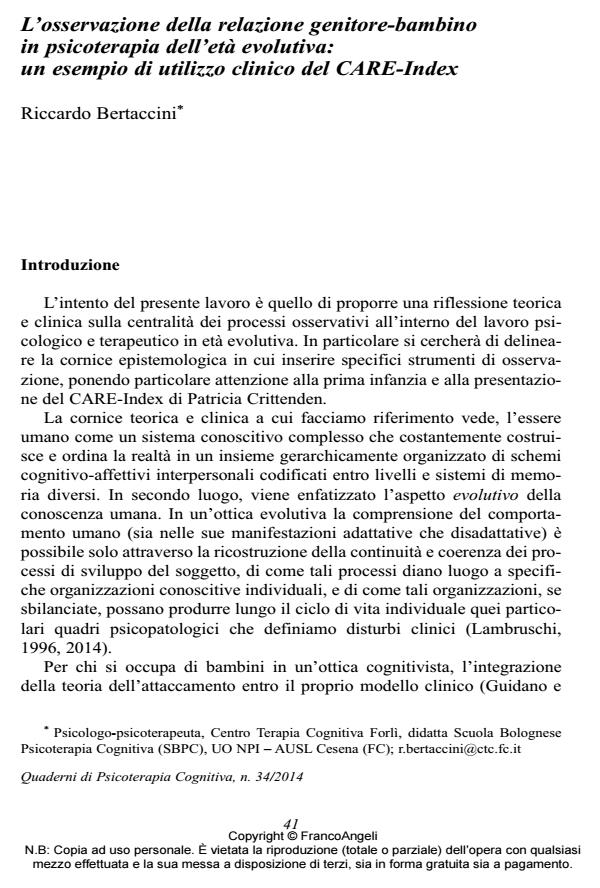The observation of the parent-child relationship in developmental psychotherapy: a clinical example of the use of the CARE-Index
Journal title QUADERNI DI PSICOTERAPIA COGNITIVA
Author/s Riccardo Bertaccini
Publishing Year 2014 Issue 2014/34
Language Italian Pages 15 P. 41-55 File size 108 KB
DOI 10.3280/QPC2014-034004
DOI is like a bar code for intellectual property: to have more infomation
click here
Below, you can see the article first page
If you want to buy this article in PDF format, you can do it, following the instructions to buy download credits

FrancoAngeli is member of Publishers International Linking Association, Inc (PILA), a not-for-profit association which run the CrossRef service enabling links to and from online scholarly content.
Inside the complex epistemological framework of psychotherapy in cognitive- developmental perspective, the direct observation of the interactive behavior of children with their parents is a central part of the diagnostic process and assessment in general. The most recent developments in theory, stimulate us to observe and understand the different configurations of attachment such as: specific interactive patterns observed on the behavioral level, specific strategies for protection from danger; specific modes of regulation of emotional states, but also as a specific mode of processing information about the self and the world, ways of using the mind that we learn tacitly in the relationship with our figures of attachment, learning to give relief and to rely on a few sources of information (cognitive or affective) rather than on others. The cognitive- developmental perspective, taught us long ago to seek health and mental illness of the child in the vicissitudes of his emotional ties, the ability to conserve the continuity and consistency of their self-organizing processes. So, Attachment Theory, becomes the framework for structuring a method of observation of dyadic interactions between adult and child to collect data useful for the definition of their relational functioning (and therefore the specific interactive patterns in place), but also important aspects of the functioning and organization of the self of the child and the caregiver. This paper will examine the instrument of the CARE-Index, realized by Patricia Crittenden, both from a theoretical point of view but also in its clinical applications and video-feedback intervention methodology.
Keywords: Attachment, observation, cognitive psychotherapy, CARE-Index
Riccardo Bertaccini, L’osservazione della relazione genitore-bambino in psicoterapia dell’età evolutiva: un esempio di utilizzo clinico del CARE-Index in "QUADERNI DI PSICOTERAPIA COGNITIVA" 34/2014, pp 41-55, DOI: 10.3280/QPC2014-034004